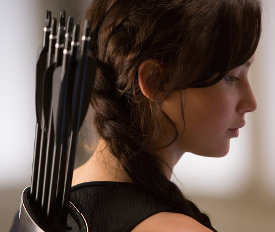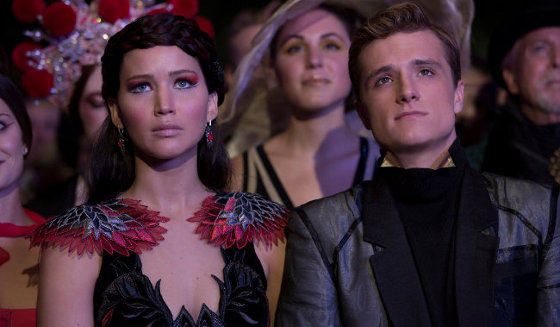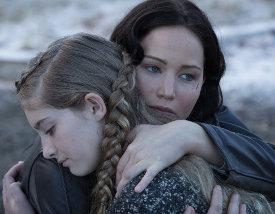 The Hunger Games: Catching Fire is very much a typical sequel with the same inherent strengths and weaknesses of the first film. Those who enjoyed The Hunger Games (based on a series of teen fiction) are likely to enjoy this one as well. And those, like me, who found the first film wanting will have a similar reaction to the sequel, directed by Francis Lawrence.
The Hunger Games: Catching Fire is very much a typical sequel with the same inherent strengths and weaknesses of the first film. Those who enjoyed The Hunger Games (based on a series of teen fiction) are likely to enjoy this one as well. And those, like me, who found the first film wanting will have a similar reaction to the sequel, directed by Francis Lawrence.
Picking up a year after the events of The Hunger Games, Katniss Everdeen (Jennifer Lawrence) and Peeta (Josh Hutcherson) leave their separate lives to reconnect for a celebratory tour on the anniversary of their win. Despite little contact over the past year, the pair play up the lovers angle at the command of President Snow (Donald Sutherland) who hopes it may help quell the glimmer of insurrection Katniss’ victory began.
When Katniss proves unable to give Snow what he wants, and he realizes killing her would only create a martyr, the president reaches out to new game master Plutarch Heavensbee (Philip Seymour Hoffman) to design a scenario to end both her popularity and her life.
 As with the first film, the themes of class warfare are explored once again (mainly to make fun of the rich while ever so slowly trying to build to a revolution) but never with any more depth than you might find a 12 year-old’s Live Journal diary. Yes, the movie points out the obvious flaws to the system and monetary inequality between the districts and the Capitol, but the simplistic black-and-white hamfisted nature of all such themes (none of which are ever explored with any real depth or thought) grows tiresome over the 146-minute running time.
As with the first film, the themes of class warfare are explored once again (mainly to make fun of the rich while ever so slowly trying to build to a revolution) but never with any more depth than you might find a 12 year-old’s Live Journal diary. Yes, the movie points out the obvious flaws to the system and monetary inequality between the districts and the Capitol, but the simplistic black-and-white hamfisted nature of all such themes (none of which are ever explored with any real depth or thought) grows tiresome over the 146-minute running time.
On the Hunger Games (rather convenient) 75th Anniversary, Heavensbee comes up with something new by pitting various winners of all 12 Districts (who also coincidentally all still having living male and female winners) against each other in a champions vs. champions contest. Katniss and Peeta both compete for District 12 against other past winners (shirtless Sam Claflin, Lynn Cohen, Jena Malone, Jeffrey Wright, Amanda Plummer, Alan Ritchson, Stephanie Leigh Schlund, Bruno Gunn, Meta Golding, Megan Hayes, Elena Sanchez, John Casino, E. Roger Mitchell, Maria Howell) far more seasoned and skilled than the group the pair defeated only one year ago. As you might expect from such a large cast several characters get little screentime (in fact most don’t even earn the “honor” of an on-screen death scene).
And that’s one of the movie’s surprises which seems to be going out of its way to try and make the sequel even more friendly than the original. For a movie about trained killers hunting each other down in a winner-take-all battle-to-the-death there’s actually very little bloodshed especially in a story where everyone not living in the Capitol seems determined to keep the series’ heroine alive, even when such actions go against their own self-interests and have dire consequences.

Elizabeth Banks and Stanley Tucci both return for their ridiculously over-the-top roles. Tucci remains nothing more than the preening reality-TV host, but the movie does makes a point to allow Banks’ character to become more than just her ridiculous hairdo as she realizes both what Katniss and Peeta’s celebrity have meant to her and the death sentence the new games have likely condemned at least one, if not both, of them to. Sadly Woody Harrelson gets less time on-screen this time around (but still manages to steal a scene or two).
I didn’t view the film in IMAX and can’t speak to whether the format helps or hurts the action sequences, but since nearly all the action is relegated to the final third of the film I wouldn’t consider shelling out the extra money for IMAX to be any wiser than betting against Katniss surviving for yet another sequel.
 For an action series The Hunger Games has been plodding at best. Nor do the heavy dramatic elements have much weight, partially because they all center around a shell-shocked emotionally-inhibited young woman who is unable to make the audience root either for or against her survival. Although we’re constantly told that Katniss is special through the dialogue and actions of other characters. the film never attempts to properly argue whether that belief is justified (or even why it is shared by nearly every character she meets).
For an action series The Hunger Games has been plodding at best. Nor do the heavy dramatic elements have much weight, partially because they all center around a shell-shocked emotionally-inhibited young woman who is unable to make the audience root either for or against her survival. Although we’re constantly told that Katniss is special through the dialogue and actions of other characters. the film never attempts to properly argue whether that belief is justified (or even why it is shared by nearly every character she meets).
Lawrence carries herself well but the character of Katniss is rather frustrating. The only time Lawrence is really able to emote (outside the slight smiles or frowns that break of the monotony of her bored half-interested blank stare which in noticeable in almost every promotional photo) is in short bursts of anger or fear. The sequel also uses the repeated trick of showing her sadness with a single tear on her cheek (used at least three separate times). The same Katniss/Peeta/Gale (Liam Hemsworth) love triangle introduced in The Hunger Games doesn’t work any better here as there’s no chemistry between Lawrence and either of the actors once again making it impossible to root for, or care, who the heroine eventually ends up with.
The Hunger Games: Catching Fire is slightly better than the the original film but suffers from the same pacing issues and plodding narrative that hurt the first film. There’s drama (even though much of it isn’t that dramatic) and there’s action (although most of it is relegated to the final act and suggested rather than directly shown on-screen), but the flaws in The Hunger Games haven’t really been addressed. With one book left in the series, maybe the third time will be the charm (but I won’t hold my breath).







Comments on this entry are closed.